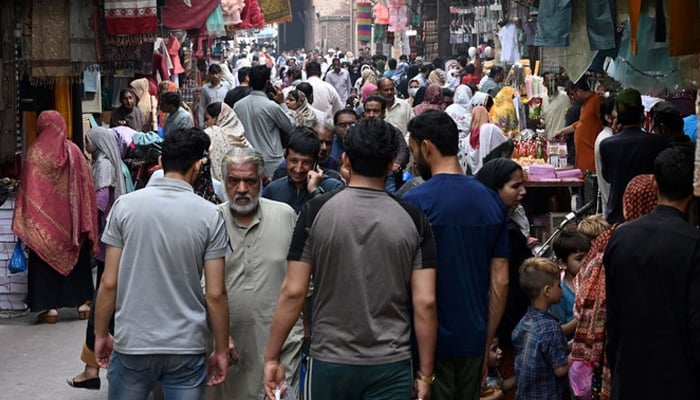Pakistan's population growth 'highest in region'
Pakistan Bureau of Statistics launches detailed results of first-ever digital census-2023
Pakistan ranked as the fifth most populous country in the world, with a population growth rate which is the highest in the region, data shared by the Pakistan Bureau of Statistics (PBS) suggested.
Federal Minister for Planning, Development and Special Initiatives Ahsan Iqbal on Thursday unveiled the “First Ever Digital Census Key Findings Report”, compiled by the PBS.
The report, which marks a significant milestone for Pakistan, provides comprehensive data crucial for the development of urban and rural areas and effective disaster response.
According to the detailed results of the 7th Population and Housing Census-2023, Pakistan is the 5th most populous country in the world with a total population of 241.49 million with all the provincial capitals' most populous cities.
The census data shows that the current population growth rate is 2.55% and if it continues, the country's population will be doubled by 2050.
As per the stats, Karachi is ranked the 1st most populous city with a population of 20.4 million while the Sindh province’s count stands at 55.70 million.
Meanwhile, Lahore is the 2nd most populous city with 13 million and the provincial population count stands at 127.69 million.
Peshawar ranks 3rd with 4.76 million Khyber Pakhtunkhawa’s population is 40.86 million, while Quetta ranks 4th with 2.59 million and 14.89 million for the provincial population count in Balochistan.
The federal capital of Islamabad’s population count stood at 2.36 million.
The census data shows that the total population of the country, 241.49 million, is represented by 51.48% males and 48.51% females, with a gender ratio of 106.12.
The average number of members in a Pakistani family is 6.30 while the dominant religion is Islam representing 96% of the population.
The age-wise enumeration of the population shows 36.47 million people under five years, 97.53 million under 15 years, 62.58 million between 15 to 29 and 190.27 million below 40 years of age.
Meanwhile, the literacy indicators show 61% of Pakistan's population aged ten years and above is literate.
As per the PBS data, population growth is adversely affecting the per capita income and standard of living of citizens. There is a need to develop an effective strategy for population control for better distribution of resources and economic prosperity.
Addressing a ceremony, the minister highlighted Pakistan’s achievement as the first country in South Asia to conduct a digital census.
“The data collected through this census will be instrumental in guiding our development efforts and enhancing our ability to respond to natural calamities,” he stated.
The census, mandated by the Constitution to be conducted every ten years, faced scrutiny in 2017 when the Sindh government expressed concerns over the results, he said.
-
Security forces gun down 30 terrorists in multiple IBOs in KP: ISPR
-
MQM-P calls for new province in Sindh
-
US report validates Pakistan military edge over India: PM
-
Banned TTP poses serious threat to Pakistan security: UNSC panel
-
CM Afridi clarifies remarks on by-poll after ECP requests army deployment
-
Dubai sees 3.2m Pakistani passengers in 2025 as airport sets new milestone
-
Security forces kill 23 Indian proxy terrorists in KP's Kurram
-
Pakistan to construct island to boost oil exploration: report












